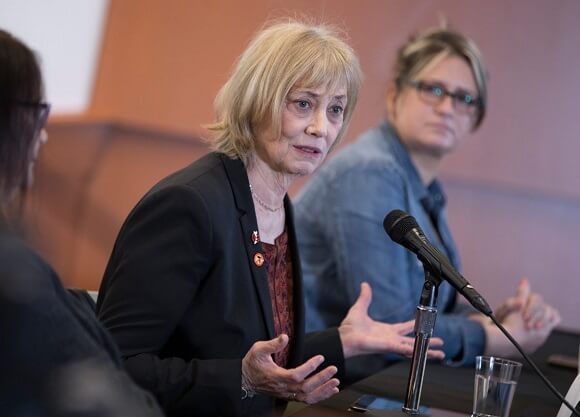
Formerly incarcerated women urge students to be agents of change
February 28, 2018

February 28, 2018

“Like the Schools of Health Sciences, Nursing and Medicine, the School of Law takes a holistic approach to legal education and the creation of lawyers,” said School of Law Dean Jennifer Brown. “We encourage our students to consider the whole client.”
Beatrice Codianni and Carol Soto, who were incarcerated at the same time as Piper Kerman, author of "Orange is the New Black: My Year in a Women’s Prison," discussed their experiences at the Federal Correctional Institution in Danbury, Connecticut. The women explained how their access to and experiences of health care impacted them during their time inside. They were joined by Jaclyn Lucibello, a woman incarcerated for three years in the York Correctional Institution in Niantic, Connecticut, the state's only female correctional facility, giving birth during her time there.
“We have to talk about language,” Codianni said. “Please don’t use ‘prisoners,’ ‘ex-convicts’ or ‘inmates.’ We are people. We are people who were in prison. It’s very important that people see us as human beings.”
There were 215,332 women in jails and prisons in the United States in 2014, according to the U.S. Bureau of Justice Statistics.
“The number of women behind bars has grown rapidly,” said Amber Kelly, assistant professor of social work in the School of Health Sciences. “Over the past 30 years, the rate of women in prison has increased by more than 700%.”
School of Law Dean Jennifer Brown urged our students to step up to the plate and use their talents to spark change.
“As you listen to the stories and wisdom of our panelists, I hope you will be inspired to think, ‘What can I do? How can I be part of a solution to some of the problems that we hear throughout the course of this conversation. We can make a difference and I’m excited to learn about ways we can be part of the solutions.”
The event, sponsored by the College of Arts and Sciences, School of Health Sciences, School of Medicine, and School of Nursing, with additional support by the School of Law, Quinnipiac Prison Project, Campus Crosstalk, Albert Schweitzer Institute, and Department of Cultural and Global Engagement, was open to the entire university community.
“While I was there, I saw a lot of women with medical problems that weren’t being addressed,” she said. “There were several women who died.”
Soto loosely inspired the characters “Yoga Janet” in the book and “Yoga Jones” in the television show.
“I am happy for the success of Piper Kerman because I can now sit in front of you and tell you some of the horror stories we all experienced in prison,” Soto said. “It’s horrendous.”
The primary problem with medication in prison is the follow-up, she said.
“You are our future and you must help us build alternatives to incarcerations and the slave system that is our prison system,” she told the students.
School of Nursing Professor Millie Hepburn said she wished she had the perspective that our current students do.
“When I was a young nurse nearly 35 years ago I clearly lacked knowledge and compassion and as such was often unprepared for caring for patients in challenging circumstances,” she said. “We were known as the receiving hospital for all trauma in the region, including a well-known maximum security prison — but there was so much we did not know back then.”
She said the industry lacked training or education for caring for patients who were incarcerated.
“As a result, I was unsure, fearful and lacking in caring and compassion,” she said. I wish I knew then what I know now and could go back and replay those many patient encounters.
She said hearing from women who were formerly incarcerated will shape future experiences.
“Our graduates will be more mindful and they will approach their patients with insight, knowledge, care and compassion as a result of the holistic approach to learning within the School of Nursing at Quinnipiac University,” she told those in attendance. “Now is the time for transformation, and in the School of Nursing, it is our job as faculty to transform health care one student at a time.”
Quinnipiac Today is your source for what's happening throughout #BobcatNation. Sign up for our weekly email newsletter to be among the first to know about news, events and members of our Bobcat family who are making a positive difference in our world.
Sign Up Now